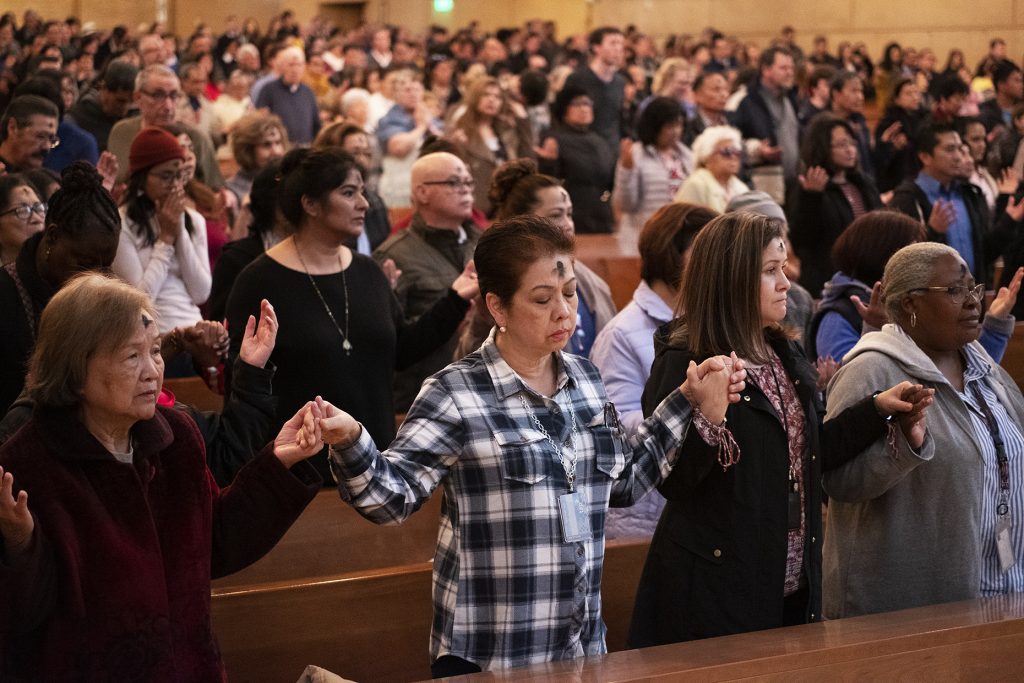This Ash Wednesday I went to the 8 a.m. Mass, as I do every weekday. The usual congregants were present — pious businessmen on their way to the office, fresh-faced moms towing their littlest still in pajamas, and those who are lucky to work from home like I do.
But on this day we were joined by throngs of Sunday Mass-only Catholics, and some I suspect who only find their way to church on Easter, or for weddings and baptisms. At least I have rarely seen them.
This phenomenon, which I’m certain was repeated at every Catholic Church across the country, is fascinating. It goes against all the things we think we know about evangelizing the fallen-away and the unengaged.
Rousing sermons, happy music, persistent optimism, promises of peace and prosperity, and never, ever the suggestion that some lifestyle choice may be wrong — these are the things we think will fill our pews. Instead, and unaccountably, they are filled on somber Ash Wednesdays.
It seems that these modern men and women whose lives are all busyness and bustle — as though to silence the awful truth that “as for man, his days are like grass, like a flower of the field...” — find a need to come each year and remember their mortality.
With eyes opened wide they strain to hear the quiet murmur of the priest who paints their foreheads with the sign of death, and reminds them that their physical self is as evanescent as the ash that falls off the tip of a cigarette.
In a culture where reminders of death have been banished to the outer darkness, and funerals have been replaced by “celebrations of life,” these thirsty souls relish the hymns that are nothing less than plaintive dirges.
If it is surprising that these kinds of persons interrupt their lives to reflect on inexorable death, it’s even more astonishing that they come to acknowledge wrongdoing. “Thoroughly wash me from my guilt and from my sin cleanse me,” is the phrase that sounded from the ambo, and from the pews the response was a heartfelt: “Be merciful, O Lord, for we have sinned.”
That word sin is a strange anachronism, for the modern person steeped in moral relativism is sure that sin, like beauty, is in the eye of the beholder, and therefore nowhere.
The inner logic runs like this: What’s wrong for me is simply that, and anyway, I can’t be held responsible for the painful way things have turned out, when my very happiness depended on my acting just the way that I did.
The golden rule that oriented us outward and away from the incessant demands of our ego has been definitively superseded by a directive to pamper the self, and now reads: “Do unto others what you must do, that you may live.”
And yet. And yet.
They come streaming up the aisle on Ash Wednesdays, year after year. They hold up their foreheads to the damp and gritty finger of the priest who traces the mark of Cain on their clean skin, and perhaps they feel a rush of relief.
For these few hours while the smudge holds, the long inner battle against the demands of the conscience can rest.
For all the while that they have lived in the therapeutic vision that enjoins guilt-free surrender to the claims of the self, the truth has been bubbling just under the surface. There was a moment in each personal failure when bravery, selflessness, love of neighbor — or just a little patience — could have carried the day.
Though the ship might still have sunk, or the temporal battle might still have been lost, they could have emerged triumphant — because they had been noble, not mean, generous, not greedy, heroic, not cowardly.
To feel the humid smear of ashes on the brow is to rest in the consciousness of that truth, and welcome the remorse that cleanses and relieves the spirit. Yes, I loved my comfort more than I loved her, or him, and I’m so very, very sorry.
We daily Massgoers are no better, of course, than our brothers and sisters who join us on Ash Wednesdays. We are just more fortunate, for we know that the sweet cleansing and relief of repentance is available every day of the year, and it is answered by inexhaustible mercy.
As for the consciousness of death, a daily reminder to forgive quickly and love better, lest this be our last day on earth, is built into the holy Eucharist.
I know that the Ash Wednesday Massgoers stepped out into the world with a visible sign and a deep, invisible happiness. Perhaps this is the right way to reignite the flickering flame of the dispirited and disengaged: through consciousness of those old nuisances, death and sin.
I know it doesn’t make human sense, but it must make divine sense.
Dr. Grazie Pozo Christie grew up in Guadalajara, Mexico, coming to the U.S. at the age of 11. She has written for USA TODAY, National Review, The Washington Post, and The New York Times, and has appeared on CNN, Telemundo, Fox News and EWTN. She practices radiology in the Miami area, where she lives with her husband and five children.
SPECIAL OFFER! 44 issues of Angelus for just $9.95! Get the finest in Catholic journalism with first-rate analysis of the events and trends shaping the Church and the world, plus the practical advice from the world’s best spiritual writers on prayer and Catholic living, along with great features about Catholic life in Los Angeles. Subscribe now!

